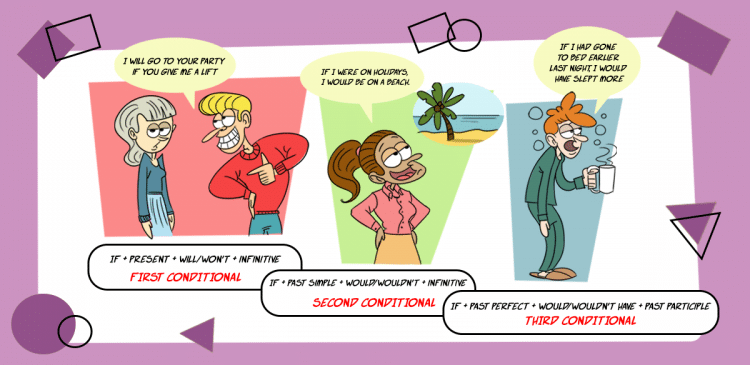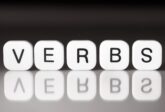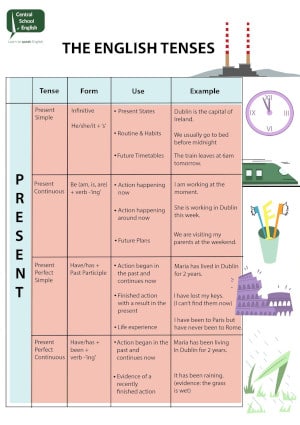Conditionals – Zero, First, Second and Third

If you could become fluent in any language, which language would you choose?
I hope you said English! If you didn’t, that is quite alright too.
Learning a new language takes time and effort but it’s well worth it.
It is particularly important to learn grammar that we use in everyday language.
You’ve probably heard of conditionals before. Well we are going to review them in this blog post.
We will talk about:
The Zero Conditional
The First conditional
The second conditional
The third conditional
The Zero Conditional - Always true
The Zero Conditional is used to talk about results that are always true under certain conditions. Confused? Let’s look at some examples which will make it easy to understand.
The Zero Conditional is often used to talk about facts. For example, water boils at one hundred degrees Celsius. This is a fact. It is always true. We can express this idea with the zero conditional:
If you heat water to one hundred degrees Celsius, it boils.
We form the zero conditional like this:
If/When + present simple, present simple
Notice that we can use If or When in the zero conditional.
Let’s look at some more examples of scientific facts using the zero conditional:
If you multiply three by four, you get twelve.
When water droplets in clouds get too heavy, it rains.
If you heat ice, it melts.
When glaciers melt, the water level rises.
We also use the zero conditional to talk about things that are always true in our daily lives.
For example, maybe you get headaches sometimes and every time you get a headache you take some paracetamol. Using the zero conditional you could say:
When I get a headache, I take some paracetamol.
Here are some more examples:
When we’re tired, we go to bed.
If I’m hungry, I get irritable.
When she calls me, I feel happy.
We can also use the zero conditional to give instructions. Here are some examples:
If you have any questions, just ask me.
When the guests arrive, offer them a drink.
If the program crashes, switch off the computer.
The Zero Conditional
We use the first conditional to talk things that are always true
If + present simple, present simple
The First Conditional - Future possibilities
The First Conditional is about future possibilities, things that may or may not happen in the Future depending on a certain circumstance or condition.
Supposing your friend asks you to play football tomorrow and you really want to play but can only go depending on work, you might say:
If I have no work tomorrow, I’ll play football.
This suggests that you won’t play football if you need to work.
Look at some more possible examples:
If you give me a lift, I will go to your party .( Going to the party depends on a lift)
If you buy her dinner, she will help you. ( Her help is conditional on you paying for the dinner)
We form the first conditional like this: If +present simple, will/won’t + infinitive
We can also put the if clause after the will clause : will + infinitive + if + present simple
We will pass the test if we study.(Passing the test is conditional on studying)
Note: If we put ‘if’ at the beginning of the sentence, we need to use a comma after the ‘if’ clause.
The First Conditional
We use the first conditional to talk about a real possibility in the future
If + present + will/won’t + infinitive
The Second Conditional - Imaginary situations
We use the Second Conditional for imaginary or hypothetical situations that could be now or in the future.
We often think and talk about what we would do if we had a million euro:
If I were a millionaire, I would buy a big house.
The present reality is that I am not a millionaire, and so I cannot buy a big house. I am just dreaming.
Take a look at some more examples:
If she won the lottery, she would buy a Ferrari.
If I was British, I could speak English fluently.
If I were on holidays, I would be on a beach.
To form the second conditional we use : If + past simple + would do/infinitive
The Second Conditional
We use the second conditional to talk about imaginary situations.
If + past simple + would/wouldn’t + infinitive
The Third Conditional
We use the Third Conditional to talk about imaginary situations in the past. In other words, things that didn’t happen in the past but could have happened if the situation was different.
If I didn’t get much sleep because I went to bed late, I can say:
If I had gone to bed earlier last night, I would have slept more.
The third conditional expresses how things could have been.
Check out some more examples:
If I had studied harder, I would have passed the test.
If he hadn’t called the doctor, he would not have got the medicine.
If they had saved some money, they would have bought a house.
To make the third conditional we use: If + past perfect + would/wouldn’t have + past participle
The Third Conditional
We use the third conditional to talk about imaginary situations in the past.
If + past perfect + would/wouldn’t have + past participle
Test Yourself
Use the 1st, 2nd or 3rd conditional to make a sentence for each of these situations.
Example: Andrew arrived at the airport late and missed the flight.
Answer: If Andrew had arrived at the airport early, he wouldn’t have missed his flight.
- I will go to her party on condition that I have a lift.
- I would buy a big house on condition that I won the lottery.
- Nikola is very tired today as she went to bed late last night.
- Marina didn’t get married to the man because she didn’t love him.
Test Yourself
Choose the correct answer
If you enjoyed this post and would like to know more, check out this post on mixed conditionals.
Thank you for reading our post. You’ll find more English grammar tips elsewhere on our site and if you’d like information on our English courses in Dublin, please do not hesitate to contact us.





